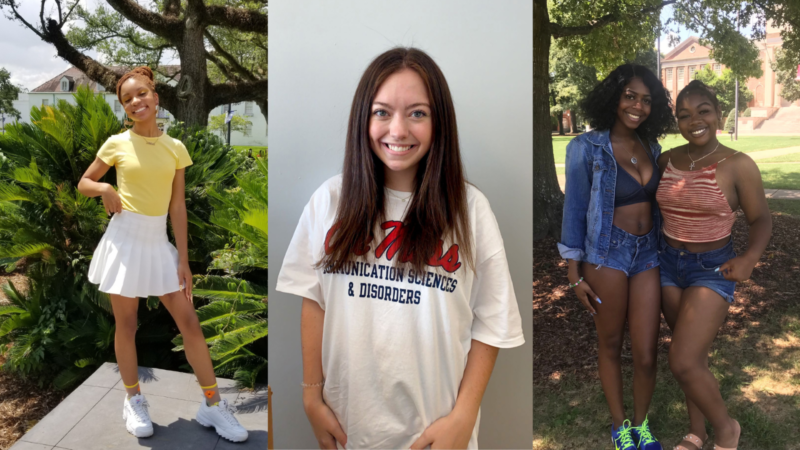From Optimistic To Anxious: How College Students In The Gulf South Feel About Returning To Campus
(Left to right) Akilah Northern, Natalie Robbins, Jada Griggs and Teralyn Campbell all feel differently about returning to their universities’ campuses for this fall.
As college students in Alabama, Louisiana and Mississippi return to campus for the fall semester, some are excited to get a taste of the campus, while others are frightened.
With coronavirus vaccines available, universities planned to return to normal operations by now, but the delta variant’s rapid rise, coupled with the region’s low vaccination rate, caused many to reverse course.
Many schools implemented new COVID guidelines, such as indoor mask mandates and regular testing requirements for unvaccinated students. Most did not make vaccinations a requirement initially since vaccines were still being used on an emergency basis. Pfizer’s COVID vaccine receiving full FDA approval on Monday, however, could change that.
So, how are students feeling about the start of the new school year? Here is what four students from Dillard University in New Orleans, the University of Alabama and the University of Mississippi in Oxford had to say:
‘I Didn’t Expect Two Years Of College To Be Like This’
“The guidelines at Dillard, as of now, are we are going on campus and we’re supposed to have in-person classes. I definitely think that those guidelines will change. I think that we might go back to completely online because, honestly, the cases in Louisiana now are worse than they were when we first went in 2020.
I feel very anxious about it, honestly, and also just sad because I didn’t expect two years of college to be like this.
I thought if we can get through freshman year, it’ll be better. What if every year it feels like we’re getting better and then when it’s time for school to start, there’s another variant or there’s another outbreak or things are getting worse? It’s just kind of a cycle where you feel like we’re almost out of it, but then we never get out of it.”
— Akilah Northern, sophomore, Dillard University‘On Campus I Feel Safe’
“I would say on campus I feel safe. It’s only so much you can do with it being so many people.
The mask mandate, I feel like it’s the best thing that you can do for a campus of this size. And if everyone just does their part and keeps their mask on, washes their hands, just keeping things clean, I feel like we shouldn’t have problems in the fall.”
— Jada Griggs, Senior, University of Alabama‘All I Want For Christmas Is Finishing This Semester Without A Lockdown’
“I feel safe. I definitely feel as if that there’s nothing that would change my feelings of safety unless that there was no mask mandate. Optimism is key. I’m trying to stay as optimistic as possible.
[I’m looking forward to] football season, tailgating, and finishing the semester without another lockdown. That’s literally all I want out of life. All I want for Christmas is finishing this semester without a lockdown.”
— Teralyn Campbell, senior, University of Alabama‘I Know Everyone’s Looking Forward To It, But It’s Frightening’
“I’m not looking forward, necessarily, to going to class in-person. I would definitely choose virtual learning if that was an option I was given.
I’m most worried that something will happen to my grandmother. Something like COVID, if I was responsible for giving that to her, I would feel so guilty for the rest of my life, because that’s something that would be completely fatal to her health. Right now, I’m at a place where I don’t know when I’ll go home again or when I’ll see her again.
In the spring this year, when Ole Miss announced that we were going to go back to full capacity in the stadium, and we were going to reopen The Grove, I was looking forward to returning to that sense of normalcy.I didn’t think that this would happen. And I didn’t think the delta variant was going to be a thing. I didn’t think it was going to affect our state the way that it has, but now we’re here. I know everyone’s looking forward to it, but it’s frightening.”
— Natalie Robbins, senior, University of Mississippi
This story was produced by the Gulf States Newsroom, a collaboration between Mississippi Public Broadcasting, WBHM in Birmingham, Alabama, WWNO in New Orleans and NPR.
Birmingham is 3rd worst in the Southeast for ozone pollution, new report says
The American Lung Association's "State of the Air" report shows some metro areas in the Gulf States continue to have poor air quality.
Why haven’t Kansas and Alabama — among other holdouts — expanded access to Medicaid?
Only 10 states have not joined the federal program that expands Medicaid to people who are still in the "coverage gap" for health care
Once praised, settlement to help sickened BP oil spill workers leaves most with nearly nothing
Thousands of ordinary people who helped clean up after the 2010 BP oil spill in the Gulf of Mexico say they got sick. A court settlement was supposed to help compensate them, but it hasn’t turned out as expected.
Q&A: How harm reduction can help mitigate the opioid crisis
Maia Szalavitz discusses harm reduction's effectiveness against drug addiction, how punitive policies can hurt people who need pain medication and more.
The Gulf States Newsroom is hiring a Community Engagement Producer
The Gulf States Newsroom is seeking a curious, creative and collaborative professional to work with our regional team to build up engaged journalism efforts.
Gambling bills face uncertain future in the Alabama legislature
This year looked to be different for lottery and gambling legislation, which has fallen short for years in the Alabama legislature. But this week, with only a handful of meeting days left, competing House and Senate proposals were sent to a conference committee to work out differences.








